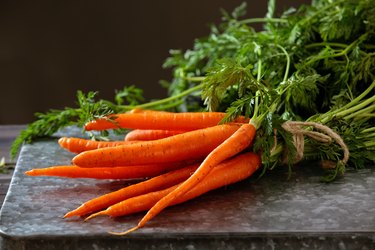
It's no coincidence that carrots have a permanent place in the produce aisle — the sweet root vegetable is a popular snack; a common ingredient in soups, stews, salads and slaws; and a staple of crudite platters.
Besides being versatile and inexpensive, carrots are healthy — they're a low-calorie source of beta carotene, dietary fiber, and several vitamins and minerals. Although a carrot-rich diet has its benefits, eating copious amounts of the bright orange vegetable can cause some unwelcome side effects.
Video of the Day
Video of the Day
1. Carotenemia
Carrots are the leading source of beta carotene in the American diet. Beta carotene is one of a few carotenoids that your body converts to vitamin A, a nutrient that protects good vision, eye health and immunity — and it's among the more abundant aspects of the nutrition of carrots.
One cup of chopped, raw carrots provides about 430 percent of the recommended daily value for vitamin A based on a 2,000-calorie diet, while an 8-ounce glass of carrot juice delivers more than twice that amount. Eating large quantities of carrots doesn't put you at risk of vitamin A overload because your body only converts beta carotene as needed.
However, having large amounts of carotene in your blood can cause carotenemia, or yellowish discoloration of the skin. The harmless condition is typically most apparent on palms, soles and ears and disappears gradually on a lower-carotene diet.
2. Bowel Changes
Carrots are a good source of dietary fiber — you'll get about 4 grams from a cup of chopped, raw carrots and about 5 grams from a cup of sliced, cooked carrots. Insoluble fiber, the kind that binds to water and promotes efficient digestion and bowel regularity, accounts for more than 80 percent of the fiber in raw carrots, according to the U.S. Department of Agriculture.
Even a modest increase in dietary fiber could temporarily disrupt your bowels, and consuming large amounts of insoluble fiber can cause stomach pain and loose stools until your digestive system adjusts to the higher fiber intake. A high intake of insoluble fiber can also lead to constipation if you don't drink enough fluids to help the fiber move through your intestinal tract.
3. Other Potential Side Effects
Eating too much of any one food often implies a limited diet, or one that excludes other healthy foods. Carrots may help you get plenty of vitamin A, dietary fiber, potassium, magnesium, and vitamins C, B-6 and K, but they aren't a particularly good source of most other nutrients, including calcium and iron.
They're also low in fat, a nutrient that's essential to your body's ability to absorb and use beta carotene as well as vitamin A. Eating a varied diet — a one in which you eat a range of foods in moderation — is the best way to meet your body's nutritional needs.
What's Considered Eating Too Many Carrots?
Although you may be eating too many carrots if your skin has yellowed or you have loose stools, other foods can contribute to both of these problems. A diet rich in tomatoes, winter squash or sweet potatoes can cause carotenemia, just as eating more whole grains, dried beans and dried fruit can temporarily loosen stools.
The Centers for Disease Control and Prevention advises most women to consume 2 to 3 cups of vegetables a day, and most men to eat 2.4 to 4 cups a day. It takes just six baby carrots to make a 1/2-cup serving.
- Fruits and Veggies More Matters: How Many Fruits and Vegetables Do You Need?
- Office of Dietary Supplements: Vitamin A
- USDA Agricultural Research Service: Individual Sugars, Soluble, and Insoluble Dietary Fiber Contents of 70 High Consumption Foods
- Centers for Disease Control and Prevention: How Many Fruits and Vegetables Do You Need?
- Medical News Today: How Much Fiber is too Much?
- The University of Chicago: Carotenemia